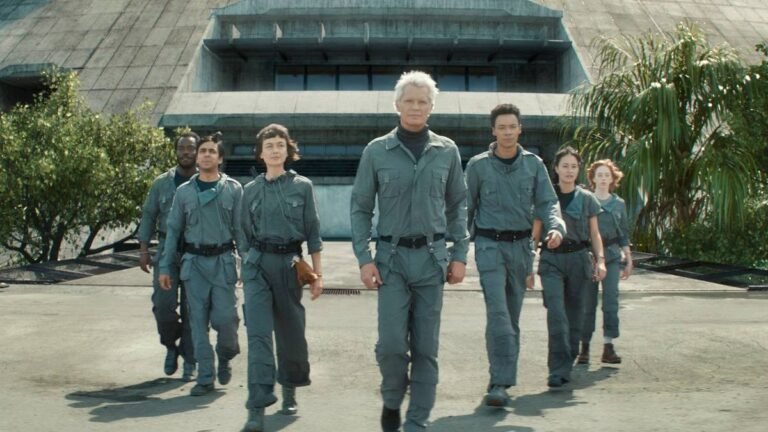Editor’s note: The below contains spoilers for Alien: Earth Episodes 1 & 2.
The Alien franchise has always been focused on the race for immortality, and Noah Hawley‘s perfect organism, the FX original series Alien: Earth, kicks off its debut episode with a title card that reads, “The race for immortality will come in three guises”: synthetics, cyborgs, and hybrids. The exploration of artificial intelligence is nothing new to pop culture, as we’ve seen in legendary films like The Terminator and The Matrix, but Alien depicts a world where humans and artificial intelligence coexist. Much like humans, some have good intentions and others do not, but what is the difference between these three “guises”?
What Are Synthetics?
Synthetics, or synths, are artificially intelligent humanoid androids created for, firstly, financial gain, but also for research and labor. Most of the synths seen in Alien projects were created by Weyland-Yutani, one of the five corporations that own and run various territories on Earth, but as fans have seen in Alien: Earth, Prodigy also produces synths, with Kirsh (Timothy Olyphant) being a primary example. Synths are faster, stronger, and more durable than the average human, as well as being the most cost-effective, making them a more ideal candidate for deep space missions that span many years than human employees. They are also impervious to pain and emotions, giving them the ability to operate in hazardous conditions that would be impossible for humans.
The first synth fans are introduced to is Ash (Ian Holm) in the original Alien film, but the first model of synths is David (Michael Fassbender), who is introduced in Ridley Scott‘s prequel film Prometheus. Weyland-Yutani-made synths are also programmed to protect xenomorphs, which is why the films don’t ever see xenomorphs or facehuggers attacking synths, because they’re not organic beings that can be used as food or a vessel and don’t pose a threat to them. Synths usually come off as cold as their computer-based insides, but they can showcase emotions physically because of their complex programming. They are self-aware, and that fact allows them to replicate how humans feel rather than actually feeling those emotions personally.
What Are Cyborgs?
Cyborgs are humans with cybernetic enhancements, something not prevalent in the franchise until Alien: Earth. The cyborg featured in this series is Morrow (Babou Ceesay), the sole survivor of the Weyland-Yutani-owned USCSS Maginot that crash-lands in the Prodigy-owned city of New Siam. Although cyborgs are a new entry in the Alien mythos, they are seen as old models compared to synths, which makes perfect sense, seeing as the space mission the USCSS Maginot embarked on left Earth 65 years ago, making Morrow likely one of the last cyborgs in commission, with synths now dominating the landscape in technological advancement.
While cyborgs are human beings, their robotic enhancements extend their lifespan, and as fans see with Morrow, he has superhuman strength and the ability to produce weapons from his arm. Unlike most Weyland-Yutani employees, Morrow seems very aware of what xenomorphs are and how to handle them. His mission from his employer is to ensure the alien specimens survive so that the company can study them, and they take priority over any human life. Morrow has displayed an immense amount of loyalty to his corporate overlords and this exact mission, much like a lot of synths we’ve seen in past Alien films.
‘Alien: Earth’ Debuts a New Form of Synthetic Known as “Hybrid”
The Alien franchise has previously showcased a few different forms of hybrid species, usually creatures that are very weird and gross products of the mutation of a human and a xenomorph, such as the newborn in Alien: Resurrection and the Offspring seen in Alien: Romulus. For fans fearing another unholy hybrid creation, don’t fret, Alien: Earth has redefined the term. Hybrids result from a human consciousness being transferred into a synthetic body. Prodigy Corp, headed by Boy Kavalier (Samuel Blenkin), is the company behind this technological breakthrough, using terminally ill children as their test subjects. Hybrids also have technopathic abilities, allowing them to manipulate technology. Alien: Earth explains that adult brains are too unyielding for this type of transfer, and that’s why children are being used. It doesn’t hurt that the company uses kids who are on the road to death so that they can cover their tracks in this immoral science project.
The hybrids live in the Prodigy-owned “Neverland” research facility, and as the children’s former identities are declared dead, self-proclaimed Peter Pan, Boy Kavalier, aptly names each child as a member of his new group of Lost Boys. Boy Kavalier’s first test subject is renamed Wendy (Sydney Chandler), who serves as the leader of this group of children now inhabiting invulnerable exoskeletons. The rest of the group is made up of Tootles (Kit Young), Slightly (Adarsh Gourav), Curly (Erana James), Nibs (Lily Newmark), and the only character not named after a Lost Boy, Smee (Jonathan Ajayi). Hybrids have the same physical makeup as synths, but there is one major difference — since they have a human consciousness instead of artificial intelligence, they do have emotional responses in comparison to the programmed nature of synths.
Hybrids take the moral dilemma explored in Alien projects to a new level, diving further into the thought of consciousness and what truly makes something human. Wendy perceives herself as human, just in a new body, whereas Kirsh questions why she feels that way, as his programming perceives her as the same as himself. This showcases the next step in the race for immortality, creating vessels that are ageless with human consciousness. The big question is, are the Lost Boys just guinea pigs in order to be able to transfer fully formed brains into these hybrid bodies? The fact that Prodigy uses terminally ill children points to that theory, but Boy Kavalier’s true intent remains to be seen in the first two episodes of Alien: Earth.
The first two episodes of Alien: Earth are available to stream on Hulu, with new episodes out every Tuesday.

- Release Date
-
August 12, 2025
- Directors
-
Dana Gonzales, Ugla Hauksdóttir, Noah Hawley






